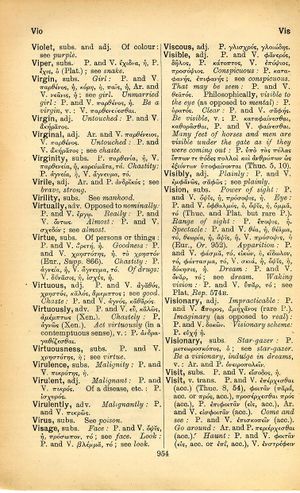virginal: Difference between revisions
From LSJ
οὕτω γὰρ συμβαίνει ἅμα καὶ ἡ τῶνδε εὐγένεια κοσμουμένη → for by so doing we shall also celebrate therewith the noble birth of these heroes
(3) |
m (Woodhouse1 replacement) |
||
| Line 1: | Line 1: | ||
{{Woodhouse1 | {{Woodhouse1 | ||
|Text=[[File:woodhouse_954.jpg|thumb|link={{filepath:woodhouse_954.jpg}}]] | |Text=[[File:woodhouse_954.jpg|thumb|link={{filepath:woodhouse_954.jpg}}]] | ||
===adjective=== | |||
Ar. and V. [[παρθένειος]], V. [[παρθένος]]. | [[Aristophanes|Ar.]] and [[verse|V.]] [[παρθένειος]], [[verse|V.]] [[παρθένος]]. | ||
[[untouched]]: [[prose|P.]] and [[verse|V.]] [[ἀκήρατος]]; see [[chaste]]. | |||
}} | }} | ||
{{Lewis | {{Lewis | ||
Revision as of 09:09, 20 May 2020
English > Greek (Woodhouse)
adjective
Ar. and V. παρθένειος, V. παρθένος.
untouched: P. and V. ἀκήρατος; see chaste.
Latin > English (Lewis & Short)
virgĭnal: ālis, v. virginalis, II.
Latin > French (Gaffiot 2016)
virgĭnăl, ālis, n.,
1 animal de mer : Apul. Apol. 34, 5 [avec jeu de mots, cf. § 2 ]
2 parties sexuelles de la femme : Sol. 1, 67 ; Prud. Perist. 14, 8.
Latin > German (Georges)
virginal, ālis, n., s. virginalis.
Spanish > Greek
ἄλεκτρος, ἀσυνδύαστος, ἀκραιφνής, ἀδιακόρευτος, ἄφθορος, ἀπειρόγαμος, ἀπαρθένευτος

